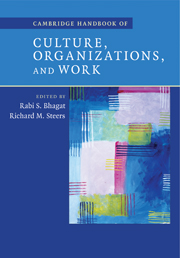Book contents
- Frontmatter
- Contents
- List of figures
- List of tables
- List of contributors
- Preface
- PART I CULTURAL FOUNDATIONS
- PART II CULTURE AND ORGANIZATION THEORY
- PART III CULTURE AND ORGANIZATIONAL BEHAVIOR
- PART IV FUTURE DIRECTIONS IN THEORY AND RESEARCH
- 18 Improving methodological robustness in cross-cultural organizational research
- 19 Culture, work, and organizations: a future research agenda
- Index
18 - Improving methodological robustness in cross-cultural organizational research
Published online by Cambridge University Press: 15 December 2009
- Frontmatter
- Contents
- List of figures
- List of tables
- List of contributors
- Preface
- PART I CULTURAL FOUNDATIONS
- PART II CULTURE AND ORGANIZATION THEORY
- PART III CULTURE AND ORGANIZATIONAL BEHAVIOR
- PART IV FUTURE DIRECTIONS IN THEORY AND RESEARCH
- 18 Improving methodological robustness in cross-cultural organizational research
- 19 Culture, work, and organizations: a future research agenda
- Index
Summary
Some of the largest and best known cross-cultural psychological projects come from the domain of organizational research; good examples are Hofstede's (1980, 2001) study on attitudes of IBM employees and the GLOBE study which involved sixty-two countries (House et al. 2003). However, these large projects are somewhat atypical in that most cross-cultural organizational studies involve two or three cultures. The current chapter provides an overview of basic issues in cross-cultural organizational research. The combination of a large interest in cross-cultural organizational research and the lack of a formal training of many researchers in cross-cultural methods create the need to reflect on these basic issues. The central question is how we can improve the methodological robustness of our research which, as we expect, will contribute to the validity and replicability of the conclusions derived from our research. We do not discuss the theories that are used in this field but focus on the methodological issues that are common to crosscultural research (a good overview of current theories can be found in Smith, Bond, and Kagitcibasi, 2006).
The chapter deals with two kinds of methodological issues. The first involves the basic question of the comparability of constructs and scores across cultures (Poortinga, 1989). Comparability of scores across individuals obtained in a monocultural setting is typically taken for granted. We readily compare scores from participants in different organizations once we have established an adequate reliability and factorial composition of the instrument. Managers routinely use survey instruments and tests developed in different cultural contexts to make decisions about selecting or promoting employees, to judge morale and satisfaction of staff or to evaluate effectiveness of training programmes, interventions or organizational effectiveness.
- Type
- Chapter
- Information
- Cambridge Handbook of Culture, Organizations, and Work , pp. 491 - 517Publisher: Cambridge University PressPrint publication year: 2009
- 16
- Cited by



